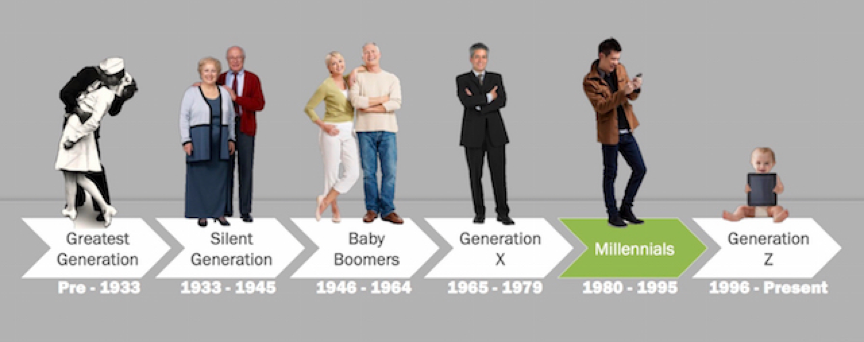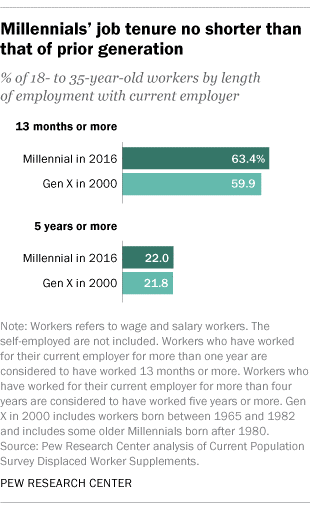
This article sets out to question the myth that appears to be a recurring theme in so many newsletters, blogs and articles around changes to working practice because of the millennial’s and how we might embrace the ability of our younger workforce to support greater employee engagement.
Let us share some of the headlines though and ponder for a while on these statements.
“How to Work with and Manage Millennials”: Source; Money Crashers
Millennials expect more from their employment. The generation of Mark Zuckerberg and Sean Parker has seen plenty of young people get rich before their 30th birthdays. The result can be a sometimes ruthless quest for that next big idea or a proclivity to move from company to company in search of the best opportunity.
“Who Are the Millennials?”: Source; Life Science
Millennials have been characterized in several different ways. On the negative side, they’ve been described as lazy, narcissistic and prone to jump from job to job.
“17 Reasons Millennials Are the Worst Generation”; Source Buzzfeed.
An entire article that slaughters Millennial’s
And finally, when British marketing guru Simon Sinek gave his blistering analysis of everything that’s wrong with Generation Y a couple of years ago, it hit such a nerve that it went viral within a day and has since racked up over a million hits on You Tube. With devastating clarity, he painted a picture of how a generation given everything for nothing has created a crisis of unmet expectations in the workplace: “They’re thrust in the real world and in an instant they find out they’re not special, their mums can’t get them a promotion, that you get nothing for coming in last – and by the way, you can’t just have it because you want it.”
I wonder though, how can a whole generation really be so maligned?
Let us first clarify who are millennials in terms of their generation fit. According to the Pew Research Centre we can categorises the four main generations that are still likely to be in the workplace as:
Baby Boomers: Born 1946-1964 (54-72 years old)
Generation X: Born 1965-1980 (38-53 years old)
Millennials: Born 1981-1996 (22-37 years old)
Post-Millennials: Born 1997-Present (0-21 years old)
According to Richard Fry of Pew Research as of 2019 Millennials made up over 35% of the workforce with Post-Millennials just beginning to enter the job market too. Perhaps the authors of the earlier headlines might want to reconsider their thoughts and their respective positions as they become outnumbered in the work domain.
Some of the negative areas which are raised regarding this younger workforce are:
Millennials set the bar too high because of a sense of entitlement
Millennials work to live rather than live to work
Millennials are compulsive job-hoppers
Millennials have little time for experienced colleagues
And yet there is little evidence to substantiate many of these slurs and I would go as far as to say that where these allegations turn out to be true it may well be down to mismanagement rather than a character floor of an entire generation.
Lets us consider each of the 4 negative items listed above:
Millennials set the bar too high because of a sense of entitlement.
This sounds a little like ambition to me! Was I any different? (I am a baby boomer) Certainly many of my own generation were making headways in the 1980’s and felt we could conquer the world. Why would we not want to encourage our workforce to be ambitious and strive to achieve their goals? I think I would rather employ someone in my business who has high aspirations than an employee who just turned up. I would feel a genuine sense of failing if I could not create the environment where my teams were not able to grow and develop and surely this would evidence a lack of leadership ability on my part.
I wonder how we can embrace the ambitions of our younger workers by enhancing our leadership skills and making use of advances in technology to support employee engagement?
Millennials work to live rather than live to work.
There is substantial evidence that over working can lead to mental health challenges and overall, the wellbeing of our workforce should be of high importance to our organisation stakeholders. According to an article by Josh Wilson in the Daily Telegraph in November 2018 work-related stress, anxiety or depression accounted for over half of all working days lost due to ill health in Great Britain.
In total, 15.4 million working days were lost in 2017/18 as a result of the condition, up from 12.5 million in 2016. This equates to 57.3 per cent of the 26.8 million workdays lost to ill health according to figures released by the Health and Safety Executive (HSE).
And, according to the American Institute of Stress:
- 83% of US workers suffer from work-related stress.
- US businesses lose up to $300 billion yearly as a result of workplace stress.
- Stress causes around one million workers to miss work every day.
- Only 43% of US employees think their employers care about their work-life balance.
- Depression leads to $51 billion in costs due to absenteeism and $26 billion in treatment costs.
- Work-related stress causes 120,000 deaths and results in $190 billion in healthcare costs yearly.
I would argue strongly that the Millennials probably have much to teach the older generation around work life balance and that rather than the concept of living to work, they use work as a means to living which in turn will produce happier and more interesting work colleagues. What’s not to like?
I wonder how we can support our workforce to enjoy work more by encouraging alternative work patterns, encourage flexible work styles and homeworking and embracing technology to support social interaction?
Millennials are compulsive job-hoppers
Statistics taken from Pew Research do not substantiate that Millennial’s are any more likely to job hop than earlier generation. I would be more concerned about my organisations ability to hold on to talent if I am observing a trend toward losing younger talent from our work pool

Is there more we could do to make the work interesting and challenging? Are we doing enough when we recruit people to ensure a correct fit? And once on-board, are we providing enough leadership to ensure we allow our teams to become the best they possibly can? Do we care enough?
So, with some of the myths put to bed, let us consider some of the great attributes that are afforded to Millennial’s and post millennial’s:
Millennials are the most educated generation in history
Millennials are on track to become the most educated generation in history. The Millennial women are outperforming the Millennial men in the classroom. Overall, Millennial girls tend to outperform boys in elementary and secondary school, getting higher grades, pursuing tougher academic programs, and participating in advanced placement classes at higher rates.
Additionally, 57% of today’s undergraduates are women, and women are now earning 170,000 more bachelor’s degrees each year than men.
Millennials are Technologically Savvy
They are the first generation to grow up constantly connected to the world and are what the Pew Research Centre has labelled “Digital natives in a land of digital immigrants.” Without a doubt, they have embraced technology like no other generation. Millennials clearly adapt faster to computer and internet services because they have always had them.
A global study of Millennials conducted by Telefonica in 2014 reveals that mobile technology is important to Millennials across the board, and it’s not all for fun and games. In addition to entertaining themselves and keeping up with social contacts, 46% of US Millennials and more than 60% of Latin Millennials said they use their devices for research and education.
The Telefonica study interviewed 6,700 men and women age 18 to 30 in the US and Western Europe.
Many Millennials everywhere see themselves as being “on the cutting edge of technology,” though they don’t necessarily want a tech career.
Millennials also have more positive attitudes about technology than other generations–they are the most likely to say that technology makes life easy rather than harder, are the most likely to say technology brings people closer together than drives them further apart, and are the most likely to say that technology allows people to use their time more efficiently.
Millennials are Civic-Oriented
Millennial generation have a strong sense of community both on local and global scale. Compared to previous generation, Millennials focus on larger societal needs rather than individual needs. People born between 1980 and 2000 are the most civic-minded since the generation of the 1930s and 1940s,” claimed USA Today.
Millennials believe in the value of political engagement and are convinced that government can be a powerful force for good.
According to Deloitte Millennial Survey 2014, Millennials consider government to have the greatest potential to address society’s biggest issues. Almost half feel governments are having a negative impact on areas identified as among the top challenges: unemployment (47%), resource scarcity (43%), and income inequality (56%).
Millennials are likely to support a progressive tax system, to want an increase in the minimum wage, to support free trade, and to believe that government regulations on businesses are necessary in order to keep them in check and to protect consumers.
Civic generations tend to bring about times of greater economic equality and more inclusive racial and ethnic concerns. Thus, it isn’t surprising that a Civic generation like Millennials shows high levels of compassion–a characteristic will certainly be instrumental in helping to build a powerful legacy.
Millennials are Practical and Results-Oriented
Millennials are interested in processes and services that work and speed their interactions.
They expect evaluation & promotion of their work to be based on the outcomes they produce and not based on age, time spent at the desk, years of experience, or position (Alsop 2008; Hill 2002). Millennials are practical, if they are offered a service, they expect it to work and they have no tolerance for services that do not continuously and reliably add value. Millennials are furious when they feel they are wasting their time; they want to learn quickly and move on.
Millennials are Team-Oriented
Millennials seem to be more people-oriented in their working style, establishing close relationships at the workplace. They prefer egalitarian leadership, not hierarchies.
After many years of collaborating at schools, sports teams and peer-to peer networks, most Millennials like working in groups and we highly prefer a sense of unity and collaboration over division and competition.
Contrary to previous generations, Millennials were brought up in an atmosphere of equal relationships and co-decision-making, and they have a community-oriented “we can fix it together” mindset. The 2007 Greenberg Millennials Study found that when respondents were asked about the best way to address the challenges facing the country, the leading choice by far was “through a collective social movement.”
In conclusion
All in all, I think the challenges I see raised are not specific to the so-called millennials but are in fact practices and requirements of any dynamic and modern workforce and a more caring community. There are things we can do as leaders and influencers to ensure the modern-day work environment can take advantages of the positive traits of the younger workforce and these include:
Make Teamwork a Part of Your Company’s Culture
Take Advantage of Electronic Literacy
Embrace Diversity and Flexibility
Focus on Results
Allow Telecommuting or Working Remotely.
Establish tools and processes that enhance employee engagement across your organisation.
Encourage working practices that support openness, honesty and transparency.
Deliver fairness in the workplace.
I am interested to understand how you view trends in the workplace that encourage team engagement.
